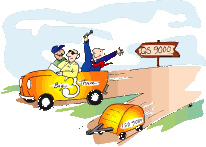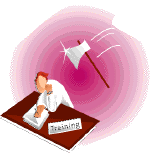|
|
|||||||||||||||||||||
 |
 |
||||||||||||||||||||
 |
|||||||||||||||||||||
Citing dissatisfaction with the planned direction of ISO 9000, the Big Three automakers have announced plans to drop the text of ISO 9000 from the next major release of QS-9000, planned for 1999. At the heart of the decision is ISO's plans to combine ISO 9000 with ISO 14000, the environmental management system standard, says Dan Reid, a member of the Big Three automotive task force that wrote QS-9000. "QS-9000 is a global requirement for our three companies worldwide," explains Reid. "It doesn't seem right from a fundamental quality system standpoint to tell some supplier in a third-world country that they've got to not only comply with QS-9000 but to put in a wastewater treatment facility [for example] as well. I don't have a problem with ISO 14000 but we don't want to make it an OEM requirement." The Big Three are already working with French, German and Italian automakers to develop a standard that harmonizes quality system requirements among the four countries and contains much of the same requirements as ISO 9000, says Reid. He notes that the new QS-9000, would probably be similar to the planned millennial release of ISO 9000 which promises to be a blend of the ISO 9001 quality assurance requirements and ISO 9004 quality management guidelines -- the proposed "consistent pair." Despite the splash Reid's announcement has made in recent trade journals and among ISO 9000 registrars, he is confident that QS-9000 sans ISO 9000 will not be a big issue for current QS-9000 certificate holders or those who will soon be seeking certification. Companies with QS-9000 documentation structured around ISO 9000's 20 elements should be able to keep their existing documentation and cross-reference to the new document, says Reid. "If we do this right, there will be one document [between the four countries] by 1999 -- it probably won't be called QS-9000," says Reid. "If a supplier has a QS-9000 compliant system in place, when the new document hits the street, there will be very little difference in the requirements." The ones most threatened by the change may be the registrars. The Big Three will select perhaps 20 registrars to perform audits as opposed to the 70 or so that do them now, says Reid. In addition, "accreditation" will not be by ANSI/RAB but by the automakers themselves -- setting up more of a quasi second-party audit rather than a true third-party audit. "This will give us more confidence in the certificates," notes Reid. Industry insiders say there may be more to the Big Three's announcement than meets the eye. Reid himself points out that TC176, the technical body responsible for ISO 9000, won't deal with the Big Three task force when working on ISO 9000 revisions because they are not officially recognized by ISO as a liaison body. By threatening to drop ISO 9000 text from QS-9000, the Big Three, which have paid ISO a reported $2.50 royalty for each of the 1.2 million QS-9000 documents distributed thus far, may be trying to force TC176 to give them a voice in the revision process.
Telecommuting -- working from home via a computer and modem -- is becoming increasingly common. By the year 2000 -- as companies discover the cost benefits of moving employees out of the office -- an estimated 20 million workers will join the telecommute, according to Marshall-Qualtec Inc., an international management consulting firm. To address the unique work environment telecommuting creates, Marshall-Qualtec offers the following tips: For the telecommuter:
For supervisors:
International Quality Technologies Inc., producers of PERFORMSuite '97 business improvement system software, has announced a new name -- InTechnology Corp. The new name reflects core values held by the business improvement software and service company since its founding in 1987. The capital "I" represents the innovation, improvement and organizationwide involvement enabled by PERFORMSuite '97. The superscript "n" signifies the exponential effects experienced by commercial and governmental organizations that incorporate these "I" qualities in their business improvement strategies. InTechnology Corp. is based in Colorado Springs, Colorado.
Tacoma Puts Deming Leaders from Tacoma, Washington, are putting the teachings of W. Edwards Deming to the test with a variety of community problems, including housing, health care, crime prevention and education. In April, Tacoma area leaders took the first step by attending a seminar sponsored by the W. Edwards Deming Institute. Community leaders spent the two days of the seminar -- "Tools and Connections for Building Communities" -- learning the basic elements of Deming's System of Profound Knowledge. Peter Scholtes, well-known author, lecturer and consultant, was among the seminar's speakers. "I was overwhelmed with how enthusiastic they were," remarks Scholtes, on the seminar's reception in Tacoma. According to Scholtes, the seminar drew a very diverse crowd -- more than 450 community leaders from various organizations attended. The next step for Tacoma and its leaders is to apply the principles to real problems in their community. Leaders will choose one problem -- from the more than 500 suggestions given at the seminar -- to focus on in the upcoming months. In September 1998, the Deming Institute plans to host a symposium to discuss what they've learned from the Tacoma project; leaders from other communities who are pursuing similar projects will also be able to come and share their experiences. The city of Tacoma's Web site has a page devoted to the Deming workshop -- www.ci.tacoma.wa.us/deming/default.htm. The page will offer a series of seven articles on the seminar and the ongoing community project. A new article will be posted to the Web site each week, and an archive will keep all previous articles for view.
As workplace stress responsible for a decline in the quality of products and services? Nearly half of the U.S. work force has acted unethically on the job as the result of workplace pressure, according to a study by the American Society of Chartered Life Underwriters and Chartered Financial Consultants and the Ethics Officer Association. The most common unethical behavior is "cutting corners on quality control," reported by 16 percent of respondents. Other reported behavior includes abusing or lying about sick days (11%) and lying to or deceiving customers (9%). One of the leading causes of pressure in the workplace is trying to maintain a work-family balance. In this area, men and women are feeling a nearly equal amount of pressure, with about three-quarters of both groups saying that on-the-job pressure had resulted in some neglect of their family. One-third of respondents reported downsizing as a cause of workplace pressure. In suggesting ways to solve problems in the workplace, the employees cited improving communications, and senior management making a more serious commitment to address the issues that cause pressure. For more information or to obtain a copy of the survey, call the American Society of CLU and ChFC at (800) 392-6900.
Five Helpful Hints for Tired Teams The team experience often begins with high levels of energy and enthusiasm on the part of its members, with people looking forward to working together and making positive steps forward in their organizations. But after the first year, those high commitment levels can begin to slip, resulting in a decline in a team's overall productivity and initiative, says Suzanne Willis Zoglio, founder and president of the Institute for Planning and Development in Doylestown, Pennsylvania. Zoglio has noted certain characteristics that are common to teams whose enthusiasm is waning. "They don't have a shared purpose," she says. "Or, if they do, it's not challenging enough." Zoglio compares the team dynamic to that of the family. "When there's a crisis in a family, people pull together and put differences aside. The same is true in a work team." Based on these observations, Zoglio developed the following five steps for helping restore the vigor to a tired team: 1. Encourage innovation from the team. 2. Offer a new perspective on the situation. 3. Raise the bar -- present new challenges. 4. Revisit the ground rules. 5. Invite outsiders to join the team. To help improve your team, call Tower Hill Press at (888) 370-8807 and ask for a free self-assessment titled, "What Kind of a Team Player Are You?" To find out more about teams, check out Zoglio's book, Teams at Work: 7 Keys to Success (Tower Hill Press).
U.S. Company Helps Russia's Chemical Industry Arthur D. Little Inc., an international consulting firm based in Cambridge, Massachusetts, has been awarded a $1.1 million contract to help improve the Russian chemical industry's environmental performance. Little's three-year contract with the Russian government is part of the Environmental Management Project, funded through a $110 million World Bank loan. "The goal is to find relatively easy and painless solutions to major pollution problems," says Chris Loreti, the project's case manager. Loreti notes that the response by the Russians to Little's project has been "generally enthusiastic, particularly among government agencies." Although there has been interest among the Russians concerning the ISO 14000 environmental management standard, Loreti says that his company "probably won't go that far in this project," noting that they want to focus their particular attention on solutions to the bigger problems. Working with Russian chemical industry specialists, Little will collect general data on as many as 200 plants throughout the Russian federation and will visit a smaller subset of that group. In addition, Little will benchmark the industry's performance against international industry norms and recommend short- and long-term changes. One of the major environmental problems in Russia, according to Loreti, is the proper disposal of solid and hazardous waste materials, due to improper facilities. The Russian governmental structure poses a particular difficulty for the work. Loreti explains that the federal government is weak and must develop individual agreements with the oblasts -- the various regional governments that formed after the decentralization of power following the end of the Soviet Union.
It's time to rethink the viability of in-house training, says Adrian Furnham, an organizational psychologist at University College London. In Furnham's opinion, "In-house trainers are expensive, difficult to manage and soon lose their competitive edge. Of all the parts of the organization to outsource, the training department should be the first." Furnham explains that he is not against training but that the negatives for in-house training outweigh the positives. First, in order to get its money's worth, a company must keep its trainers busy about 70 percent of the time, claims Furnham. This is a highly unlikely scenario for many companies where, generally, there is a flurry of training activity followed by long periods of inactivity. The result is burned-out trainers, followed by burned-up resources. In-house trainers may also only see and understand the vision of their organization, says Furnham. But dangers also exist with outsourcing, Furnham concedes. "The dangers of outsourcing are control and expense," he explains. As with outsourcing any function, the person responsible for hiring must very carefully select, brief and manage the training consultant.
Be Creative With You don't have to spend a fortune to find out what's on your customers' minds or hire an expensive market research firm to find out how you're doing. "A bit of creativity works wonders," says Robert Tucker, author of New Ways to Obtain Customer Feedback (Career Press, 1995). Tucker, a top innovation expert and leading sales and management speaker, offers seven creative customer survey solutions:
For more information, contact Tucker at 74454.1406@compuserve.com
OOPS! ITS Intertek Services' telephone and fax numbers were listed incorrectly in our May ISO 9000 Registrar Buyers Guide. The correct numbers are: We apologize for any inconvenience that this may have caused. |
|||


 Set ground rules -- discuss your new work arrangement with your family.
Set ground rules -- discuss your new work arrangement with your family.
